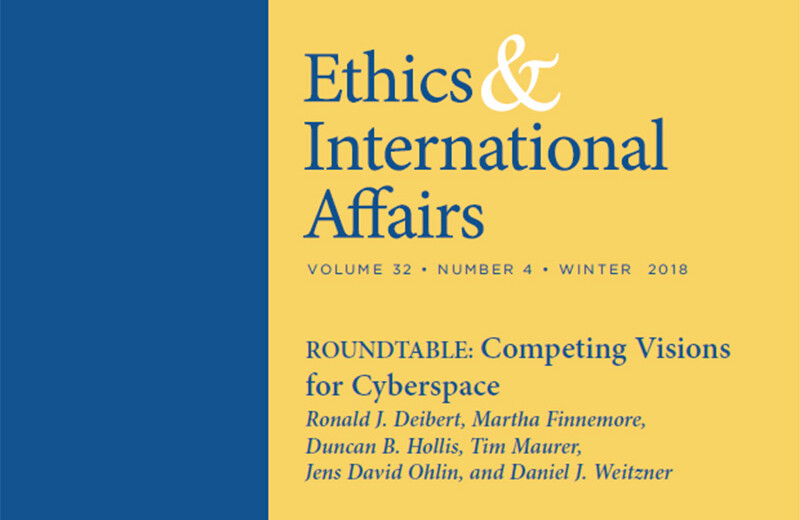The editors of Ethics & International Affairs are pleased to present the Winter 2018 issue of the journal!
The centerpiece of this issue is a roundtable organized by Duncan B. Hollis and Tim Maurer on competing normative visions for cyberspace, with contributions from Ronald J. Deibert, Daniel J. Weitzner, Duncan B. Hollis and Jens David Ohlin, and Martha Finnemore. Additionally, the issue contains an essay by Ş. İlgü Özler taking stock of the Universal Declaration of Human Rights on the 70th anniversary of its adoption; a feature by Bolarinwa Adediran assessing proposals to restrain the use of the veto at the UN Security Council; review essays by Anne Peters on international law and Micheline Ishay on human rights; and book reviews by Richard Beardsworth, Rory Cox, Christopher J. Finlay, Avery Kolers, and Michael Skerker.
ESSAY
The Universal Declaration of Human Rights at Seventy: Progress and Challenges [Full Text] Ş. İlgü Özler In this essay, Ş. İlgü Özler examines global progress toward achieving the ideals enshrined in the Universal Declaration of Human Rights. She highlights two persistent challenges: state sovereignty on one hand, and the "siloing" of human rights efforts on the other.
ROUNDTABLE: COMPETING VISIONS FOR CYBERSPACE
Introduction [Full text]Duncan B. Hollis and Tim Maurer What is cyberspace for? And why do we try to shape it?This roundtable explores what the governance of cyberspace might look like if it were geared toward just one primary purpose, such as to advance human rights, to promote economic prosperity, or to facilitate war.
Toward a Human-Centric Approach to Cybersecurity Ronald J. Deibert This essay presents an approach to cybersecurity that is derived from the tradition of "human security." This approach prioritizes the individual and views the Internet as part of the essential foundation for the modern exercise of human rights.
Promoting Economic Prosperity in Cyberspace Daniel J. Weitzner This essay argues that the original policy foundations on which the Internet was built—including strong free speech protections, open technical standards, and privacy protection—are crucial for ensuring that it continues to be an engine for economic innovation, though some of these will require adjustment.
What if Cyberspace Were for Fighting?Duncan B. Hollis and Jens David Ohlin This essay explores the ethical and legal implications of prioritizing cyberspace as a warfighting domain. The authors envision a world where states take on a greater role in governance but remain constrained by international law as well as by the norms of sovereignty, nonintervention, and self-determination.
Ethical Dilemmas in CyberspaceMartha Finnemore This final roundtable essay steps back to highlight three broad issues that cut across the other contributions and raise ethical concerns about our activity online. These are the commodification of people, vast and growing inequalities, and the tension between human security and state security.
FEATURE
Reforming the Security Council through a Code of Conduct: A Sisyphean Task? Bolarinwa Adediran In this feature, Bolarinwa Adediran disputes the utility of a code of conduct to regulate the exercise of the veto at the UN Security Council during humanitarian crises, arguing that such a code would not make any significant difference to the way mass atrocity crimes are addressed.
REVIEW ESSAYS
How Not to Do Things with International Law Anne Peters In this review essay, Anne Peters considers Ian Hurd's recent book How to Do Things with International Law. Peters argues that, although the book is provocative and compelling, it may unwittingly reinforce the realist stance that international law is simply power politics in disguise.
Human Rights Under Attack: What Comes Next? Micheline Ishay Micheline Ishay laments the recent onslaught against the human rights movement even from professed supporters, taking Samuel Moyn's recent book Not Enough as indicative of the trend. Rather than piling on more critiques, Ishay writes, what we really need are strategies and solutions.
REVIEWS [All full text]
Just Responsibility: A Human Rights Theory of Global Justice Brooke A. Ackerly Review by Richard Beardsworth Just Responsibility presents a strategic manual of action for activists in global civil society and offers a clear argument for assuming political responsibility toward basic structures of injustice in the developing world.
Return of the Barbarians: Confronting Non-State Actors from Ancient Rome to the Present Jakub J. Grygiel Review by Rory Cox In this book, Jakub J. Grygiel provocatively shows how strategic actors beyond nation-states are making resurgence. Nonetheless, his unwillingness to engage seriously with the repercussions of applying the language of barbarism to enemies of the state is troubling.
A Foreign Policy for the Left Michael Walzer Review by Christopher J. Finlay Michael Walzer's new book brings together essays from the past 16 years—most of them first published in Dissent and updated in light of recent events—to offer pragmatic ethical guidance on matters of foreign policy.
Justice and Natural Resources: An Egalitarian Theory Chris Armstrong Review by Avery Kolers In this book, Chris Armstrong defends a straightforward and highly plausible thesis: that the benefits and burdens associated with natural resources should be distributed so as to reduce global inequality.
Principled Spying: The Ethics of Secret Intelligence David Omand and Mark Phythian Review by Michael Skerker To outsiders, the world of espionage can often seem a shadowy and unintelligible realm. Principled Spying offers an interesting, thorough, and accessible engagement of the ethical issues associated with intelligence gathering and covert operations.

